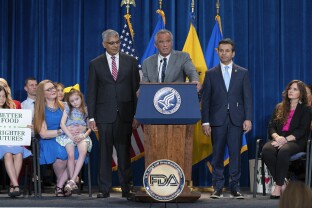The Trump administration’s health leaders came before reporters this week in an attempt to show how united they are in advancing Health Secretary Robert F. Kennedy Jr.’s “Make America Healthy Again” agenda.
Instead, they revealed divisions over whether or not that agenda is realistic.
The most stark example came over an issue Kennedy has publicly prioritized: autism. National Institutes of Health director Jayanta Bhattacharya contradicted Kennedy’s timeline for determining the causes of autism when speaking to reporters after Tuesday’s event at HHS headquarters. Bhattacharya, who was previously a professor of medicine and health policy at Stanford, said that he would like researchers to “start to put out the preliminary results” within a year. He said such a timeline would constitute a “very rapid study by NIH normal standards.”
Kennedy said at a cabinet meeting this month that HHS would uncover the cause of autism much earlier. “By September, we will know what has caused the autism epidemic, and we’ll be able to eliminate those exposures,” he said during the televised meeting.
But Bhattacharya said on Tuesday that “it’s hard to guarantee when science will make an advance.”
“Nature has its say,” he added.
The CDC’s research has indicated that autism rates have risen over the past 60 years due to a number of factors, including better awareness and diagnostic protocols as well as environmental exposures like air pollution and certain pesticides. But Kennedy said last week that he is certain rising autism rates are the result of an “environmental toxin.”
Bhattacharya seemed more willing to wait and see what the upcoming research would show, saying that the NIH would use the “normal peer-reviewed process” for selecting the programs that receive funding to study the causes of autism. He also said that the agency would attempt to get access to the medical records of a “large portion of the American population” in order to answer the question of why autism rates are rising.
Kennedy is also reportedly launching a “disease registry” to keep track of Americans with autism, which would be integrated into the medical data. Advocacy groups have criticized Kennedy’s characterization of autism as a “preventable disease.”
Bhattacharya wasn’t the only agency leader struggling to reconcile the directives passed down from Kennedy with the reality of the current state of their workforce. Tuesday’s event was pegged to the Food and Drug Administration’s new plan to phase out petroleum-based food dyes from the U.S. food supply, and in his on-stage remarks, FDA commissioner Marty Makary was confident that the agency would be able to quickly work with industry leaders to make Kennedy’s dream of an additive-free food supply a reality. (No food industry representatives were in attendance at Tuesday’s event.)
“I believe in love, and let’s start in a friendly way and see if we can do this without any statutory and regulatory changes,” Makary said.
But when speaking to reporters after the event, Makary said he didn’t have any input into the recent removal of nearly 3,500 FDA personnel made by Elon Musk’s DOGE. And he admitted that removing additives from the U.S. food supply was a “huge undertaking.”
The FDA’s plan to reform food dyes includes quickly revoking the authorization for two synthetic food colorings and “working with industry” to remove the six other synthetic food colorings by the end of 2026. In addition, the agency plans to authorize four new “natural color additives” in a matter of weeks.
Kennedy has also directed the FDA to investigate ways to eliminate food manufacturers’ ability to self-affirm that food additives are safe. That designation, known as Generally Regarded As Safe, or GRAS, has been used by the food industry as a loophole to quickly authorize thousands of food additives for use. In 1997, the FDA made the GRAS program voluntary, allowing manufacturers to say an additive was GRAS without first providing safety data to the FDA. Some ingredients that were self-authorized by manufacturers as GRAS were later found to be unsafe.
Food safety advocates have long called for the GRAS loophole to be closed. But they warn that doing so will require more resources than the FDA currently has.
Makary and the FDA may have even more on their plate soon: When asked at Tuesday’s press event if there were any pharmaceutical additives he would also like to ban, Kennedy laughed.
“We’re going to start on that next,” he said.
—
Margaret Manto is a NOTUS reporter and an Allbritton Journalism Institute fellow.
Sign in
Log into your free account with your email. Don’t have one?
Check your email for a one-time code.
We sent a 4-digit code to . Enter the pin to confirm your account.
New code will be available in 1:00
Let’s try this again.
We encountered an error with the passcode sent to . Please reenter your email.


